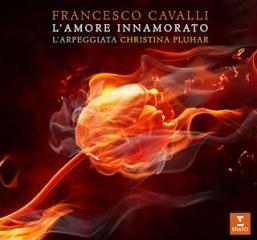Francesco Cavalli - L’amore innamorato (2015)
Francesco Cavalli - L’amore innamorato (2015)

1 L'Ormindo - L'Armonia (Prologo) 2 Il Giasone - Sinfonia 3 La Calisto - Act 1 - Piante ombrose (feat. Nuria Rial) 4 La Calisto - Act 3 - Restino imbalsamate (feat. Nuria Rial) 5 La Rosinda - Act 3 - Vieni, vieni in questo seno (feat. Hana Blazikova) 6 La Calisto - Act 1 - Verginella io morir vo (feat. Nuria Rial) 7 La Calisto - Act 1 - Ninfa bella (feat. Hana Blazikova) 8 La Calisto - Act 1 - Non è maggior piacere (feat. Nuria Rial) 9 L'Artemisia - Act 3 - Dammi morte (feat. Hana Blazikova) 10 L'Eliogabalo - Sinfonia 11 L'Artemisia - Act 2 - Affliggetemi, guai dolenti (feat. Hana Blazikova) 12 L'Ormindo - Act 2 - Che città (feat. Nuria Rial) 13 Libro quarto d'intavolatura di chitarrone - Toccata prima 14 La Didone - Act 1 - Alle ruine del mio regno (feat. Nuria Rial) 15 La Didone - Act 1 - L'alma fiacca svanì (feat. Nuria Rial) 16 Il primo libro di canzone - Sinfonie - La suave melodia Nuria Rial - soprano Hana Blažíková - soprano L'Arpeggiata (Ensemble): Cello [Baroque] – Josextu Obregon Cornett – Doron David Sherwin Double Bass – Boris Schmidt Guitar [Baroque] – Marcello Vitale Harp [Baroque] – Sarah Ridy Harpsichord, Organ – Haru Kitamika Percussion – David Mayoral Psaltery – Elisabeth Seitz, Margrit Übellacker Viola da Gamba – Lixsania Fernández, Rodney Prada Viola da Gamba [Lirone] – Paulina Van Laarhoven Violin [Baroque] – Judith Steenbrink, Veronika Skuplik Violone – Rüdiger Kurz Christina Pluhar – conductor
Amidst the splendors of Venice in the middle 17th century, no composer would have been better known than Francesco Cavalli, not even the great Monteverdi, Cavalli's teacher. Yet he is rarely heard these days, partly because his operas were massive spectacles that are extremely difficult to mount in an era of budget-cutting. The ideal solution is a collection of arias, and that's what you get here. The title, roughly "Love in Love," comes from a Cavalli opera that's not represented on the album, but it's close enough in spirit to the content of most of the arias; sex might have been mentioned too. The pair of sopranos involved are wonderful: the powerhouse Nuria Rial predominates, but the precise tones of Hana Blaziková, welcome at a time when Masaaki Suzuki's Bach cantata series is winding down, offer an attractive contrast. But the real stars of the show are the players of L'Arpeggiata and their director, Christina Pluhar. She assembles a large group of strings and keyboard instruments (a small organ is an especially nice touch) that can deliver an astonishing range of colors. These are paired with aria types that give an idea of the content of Cavalli's operas: tragic ground bass pieces, little comic tunes, virtuoso declamation that picks up where Monteverdi's late operas left off, and more. There are also purely instrumental pieces that might have been interpolated into a recital in Cavalli's own time. The Erato/Warner Classics engineering team nails the ambiance in the Salle Byzantine at the Palais de Béhague in Paris, an ideal venue. Richly sensual, and strongly recommended for anyone with the slightest interest in the crucial music of Venice or in the early Baroque in general. ---James Manheim, AllMusic Review
In L’Amore innamorato Christina Pluhar's ensemble L'Arpeggiata and sweet-voiced sopranos Nuria Rial and Hana Blažíková offer us a gem, a rarity that cleverly borrows the title of a mysterious opera by Cavalli, thought to have been lost or perhaps never premiered. Programmes of arias by Cavalli remain rare, for musicians find themselves confronted with an oeuvre that still requires rediscovery and demands more time and work than the manuscript of an opera seria. ---warnerclassics.com
Złota era włoskiej opery według wielu melomanów przypadła na XVII a nie XVIII wiek. To wtedy tworzyli Claudio Monteverdi czy też Francesco Cavalli.
Christina Pluhar i zespół L’Arpeggiata na swojej najnowszej płycie wracają do swojej pierwszej wielkiej miłości – twórczości Francesco Cavalli'ego.
Cavalli był protegowanym Claudia Monteverdiego – kompozytora, który zainspirował tę formację w 2009 roku do wydania albumu „Il Teatro d’amore”. „Muzyka Cavalli'ego pasjonuje mnie” – przyznaje Christina Pluhar. Włoski kompozytor działający w Wenecji stworzył blisko 40 oper, z których wiele jest dziełami o najwyższej wartości. Do światowego repertuaru weszły bardzo późno – dopiero w latach 60. XX wieku swoją premierę miały takie pozycje, jak „La Calisto”, „Il Giasone”, „L’Egisto” „L’Ormindo” i „La Didone”.
Na najnowszej płycie L’Arpeggiata znalazły się arie i fragmenty instrumentalne z sześciu oper Wenecjanina. Repertuar albumu uzupełniają utwory dwóch współczesnych Cavalli'emu twórców – Girolamo Kapspergera i Andrei Falconieriego. ---multikulti.com
download (mp3 @320 kbs):








